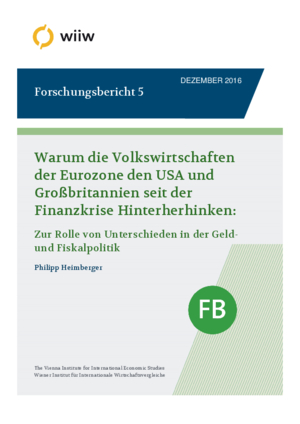Warum die Volkswirtschaften der Eurozone den USA und Großbritannien seit der Finanzkrise hinterherhinken: Zur Rolle von Unterschieden in der Geld- und Fiskalpolitik
wiiw Research Report in German language No. 5, December 2016
42 pages including 15 Figures
Zusammenfassung
Warum die Volkswirtschaften der Eurozone den USA und Großbritannien seit der Finanzkrise hinterher hinken: Zur Rolle von Unterschieden in der Geld- und Fiskalpolitik
Diese Studie befasst sich mit dem Auseinanderlaufen der gesamtwirtschaftlichen Entwicklung nach der globalen Finanzkrise im Vergleich von Eurozone, USA und Großbritannien. Die Eurozone erholte sich seit 2010 deutlich schleppender als die US-amerikanische und die britische Wirtschaft. Die Rolle von Unterschieden im wirtschaftspolitischen Kurs der drei Wirtschaftsräume wird in zwei Dimensionen analysiert; zum einen anhand eines Überblicks zur Geldpolitik der EZB nach dem Ausbruch der globalen Finanzkrise im Vergleich mit jener der Fed und der Bank of England; zum anderen durch eine Beschäftigung mit der theoretischen und empirischen Fachliteratur zum Einfluss von Fiskalpolitik auf die wirtschaftliche Entwicklung. Das zentrale Ergebnis ist, dass der restriktivere Mix aus Geld- und Fiskalpolitik in der Eurozone die im Vergleich zu den USA und Großbritannien schwächere wirtschaftliche Entwicklung zu erklären vermag. Vor dem Hintergrund der makroökonomischen und institutionellen Rahmenbedingungen in der Eurozone hatte die Austeritätspolitik ab den Jahren 2010/2011 ausgeprägt negative Effekte auf Wachstum und Beschäftigung, was die Eurozonenwirtschaft im Zusammenspiel mit der über weite Strecken zögerlichen Geldpolitik der EZB in eine Spirale aus hoher Arbeitslosigkeit, niedriger Inflation und steigender realer Schuldenlast trieb. Die USA und Großbritannien verfolgten eine expansivere Mischung aus Geld- und Fiskalpolitik als die Eurozone; und dies führte seit der Finanzkrise zu einer rascheren und umfassenderen Erholung von Wirtschaftswachstum und Beschäftigung.
Wirtschaftspolitisch ist in der Eurozone insbesondere ein fiskalpolitischer Kurswechsel sowie eine Reform des EU-Fiskalregelwerks erforderlich; denn die bestehenden institutionellen Regeln und deren restriktive Auslegung haben in den letzten Jahren eine prozyklische, krisenverstärkende Fiskalpolitik befördert. Die EZB ist mit ihrer seit Anfang 2015 betriebenen Geldpolitik des „Quantitative Easing“ auf sich alleine gestellt nicht in der Lage, die anhaltend hohe Arbeitslosigkeit und die zu niedrige Inflation wirkungsvoll zu bekämpfen. Eine koordinierte Ausweitung öffentlicher Investitionen, bei der Leistungsbilanzüberschussländer wie Deutschland und Österreich die Vorreiterrolle einnehmen, würde nicht nur kurzfristig Wachstum und Beschäftigung ankurbeln, sondern auch das angebotsseitige Wachstumspotential der Wirtschaft anheben, den öffentlichen Schuldenabbau mittel- und langfristig durch höhere (zukünftige) Steuerreinnahmen erleichtern, den Deflationskräften entgegenwirken und den Abbau von Leistungsbilanzungleichgewichten vorantreiben.
English Summary
This study analyses divergences in macroeconomic developments since the global financial crisis of 2008/2009 by comparing the euro area’s economies with the United States of America (USA) and the United Kingdom (UK). Since 2010, the euro area’s recovery from the crisis has been considerably more sluggish than the recovery in the US and in the UK. The role of differences in economic policies in those three economic regions is analysed along two dimensions: First, the study compares the ECB’s monetary policy stance with the Fed and the Bank of England. Second, the analysis deals with the theoretical and empirical literature on the impact of fiscal policy on economic developments. The main finding of the study is that the mix of monetary and fiscal policies in the euro area was less expansionary than in the US and in the UK, which explains the weaker recovery. Against the background of the macroeconomic and institutional circumstances in the euro area, fiscal austerity policies that were implemented from 2010/2011 onwards had large negative effects on economic growth and employment. In combination with the hesitant monetary policy approach of the ECB, fiscal consolidation measures triggered a vicious circle of high unemployment, low inflation and increases in the real debt burden. The US and the UK pursued a more expansionary mix of monetary and fiscal policies than the euro area; and this has led to a faster and more complete macroeconomic recovery.
In terms of economic policy, the euro area requires a more expansionary fiscal policy stance and a reform of the EU’s fiscal regulation framework, as the existing institutional rules and their restrictive interpretation have promoted pro-cyclical fiscal policies that deepened the crisis. The ECB has been pursuing aggressive Quantitative Easing measures since early 2015; left to its own devices, however, the ECB is incapable of solving the persistent macroeconomic troubles in the euro area, characterised by high unemployment and inflation well below the ECB’s inflation target. A coordinated increase in public investment – in which surplus countries such as Germany and Austria have to lead the way – would not only boost economic growth and employment in the short run, but also increase long-run growth potentials, facilitate the reduction of public debt burdens by generating (future) tax revenues, counteract deflationary forces and contribute to eliminating current account imbalances within the euro area.
Reference to wiiw databases: wiiw Annual Database, wiiw Monthly Database
Keywords: Eurozone, USA, Großbritannien, Geldpolitik, Fiskalpolitik, fiskalische Konsolidierung, öffentliche Investitionen, euro area, USA, UK, monetary policy, fiscal policy, fiscal consolidation, public investment
JEL classification: E52, E58, E61, E62, E63
Countries covered: Austria, Belgium, Cyprus, Estonia, Euro Area, Finland, France, Germany, Greece, Ireland, Italy, Latvia, Luxembourg, Malta, Netherlands, Portugal, Slovakia, Slovenia, Spain, United Kingdom, USA
Research Areas: Macroeconomic Analysis and Policy
